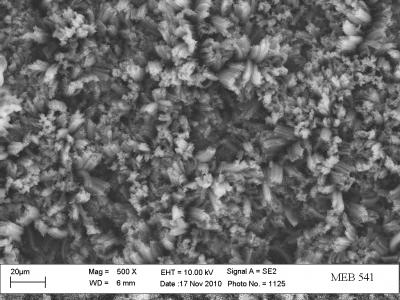Engineers at NASA have developed a black material, which can absorb over 99% of the UV, visible, IR, and far-IR light that falls on it. The NASA team at the Goddard Space Flight Center in Greenbelt, Md., presented their findings at the SPIE Optics and Photonics conference.
 This high-magnification image, taken with an electron microscope, shows an even closer view of the hollow carbon nanotubes. Credit: Stephanie Getty, NASA Goddard
This high-magnification image, taken with an electron microscope, shows an even closer view of the hollow carbon nanotubes. Credit: Stephanie Getty, NASA Goddard
The coating is actually a thin layer of carbon nanotubes having multiple walls, which are small hollow tubes composed of pure carbon nearly 10,000 times thinner compared to a strand of hair. The nanotubes are arranged vertically on several substrates including silicon nitride, silicon, stainless steel, and titanium. The nanotubes were grown by Stephanie Getty, Goddard technologist, by applying an iron catalyst layer to the substrate layers and heating the material to around 1,382„aF when the material is bathed in feedstock gas containing carbon.
According to John Hagopian, who leads the 10 member team, the researchers have performed additional testing to confirm the absorption capabilities of the material. He added that the reflectance tests proved that the team was able to extend the material's absorption range by 50 times, from the UV to the far IR regions.
The team was also able to show that the nanotubes can be used for spaceflight applications such as stray-light suppression, which warrant the need for multiple wavelength bands observation. The miniature gaps in between the nanotubes trap light and prevent reflection of the light. As only a very small amount of light is reflected from the coating, the material appears as black to the human eye and other sensitive detectors.
The material reportedly absorbs 99.5% of light in the UV and visible regions and 98% of light in the far-IR band, which shows that the nanotech-based material has 10 to 100 times more absorbent capability when compared to other materials. Hagopian said that this new technology when used in detectors will help scientists to obtain tough long-distance space measurements such as of objects that cannot be seen in visible light. He added that Earth scientists can also use this technology to study oceans and atmosphere.
Jim Tuttle, a Goddard engineer, said that super-black materials such as this nanotube coating radiate heat away and hence are useful in spacecraft equipments such as IR-sensing instruments, thus cooling them. The new coating is light weight and is extremely black and thus is a promising material for scientists.